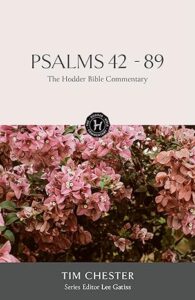The Hodder Bible Commentary
Tim Chester
Hodder & Stoughton, 2024

The Hodder Bible Commentary is a new series of commentaries, the first few of which have now been published.
I used this volume on Psalms for my daily Bible reading. It has a deeper analysis than daily Bible reading notes whilst being more readable than some dry academic commentaries.
The series editor is Lee Gatiss. The authors are from the evangelical stable. Dr Tim Chester is unashamed in identifying where the psalms prophetically speak of Jesus.
As part of the commentary on Psalm 58, Chester has a helpful sub-section on the “imprecatory psalms”. These are the controversial psalms where the writer prays that God will bring down violence against their enemies. These psalms: “seem at odds with the call in the Sermon on the Mount to love our enemies.” (Page 151).
Chester sets out some points in their defence:
• “We must read these psalms as poetry […] consider the way Jesus calls on us to ‘hate’ our parents (Luke 14:26). He’s using hyperbole, exaggeration to make the point forcefully.”
• They give a voice to those who are oppressed and suffering:
“Only as we bring our pain to God in prayer (as modelled in these psalms) are we able to leave justice in his hands rather than take it into our own hands.” Page 155.
• God is a God of justice as well as mercy:
“It is no accident that those who want to exorcise the imprecatory psalms from Christian worship are usually those who want to remove divine wrath from their account of the cross. Both reflect a failure to take seriously the demands of divine justice and holiness.” Page 153.
• Satan is behind the attacks on God’s people. There is no shame in celebrating Satan’s defeat.
That said, these psalms should not be mis-used:
“The imprecatory psalms are no justification for the use of violence by Christians. […] Under the old covenant the people of God were a politically and ethnically defined nation. […] The kingdom of God was defended by the sword […] But under the new covenant the people of God are no longer defined by birth, but rebirth. The kingdom grows through the word rather than the sword.” Page 154.
I have two quibbles with this very good and helpful book.
Firstly, there is a bit too much name dropping. It is right that the ideas of other writers are referenced so there is no plagiarism. But sometimes there are too many quotes and not enough of Chester’s own commentary.
Secondly, I am disappointed by his interpretation of Psalm 86 verse 16. His evangelicalism seems to have blinded him to other possibilities.
When commenting on verse 13, which are the words of David, they look forward to Jesus, the ‘Son of David’:
“these words take on a deeper meaning when spoken by David’s great son, the true King, Jesus. God delivered Jesus from death itself.” Page 381.
Then in verse 16 this same person addresses God, “… I serve you just as my mother did.” Chester writes:
“this line simply reinforces the servant-posture of David. In effect he is saying, ‘I am a servant and the son of a servant.'” Page 383.
But, if verse 13 refers to Jesus, then “my mother” in verse 16 refers to Mary. Chester does not offer this as a possibility. Evangelicals are suspicious of Mary due to the over-emphasis by the Roman Catholic Church. But it is an over-correction to ignore Mary entirely.
[The 1928 “A New Commentary on Holy Scripture” by Gore, Goudge and Guillaume goes too far, interpreting it as a reference to the Church: “To the Christian the handmaid can be the Church, ‘our mother'” page 364.]
March 2025
Adrian Vincent